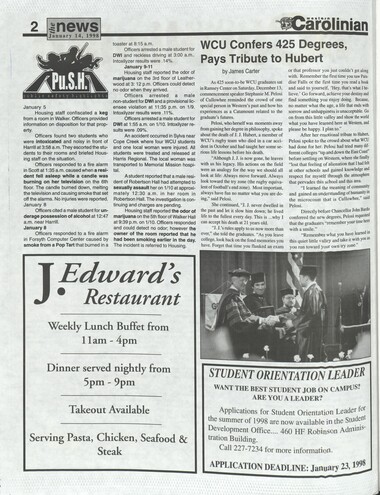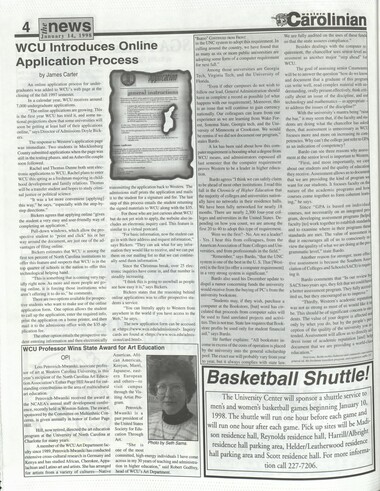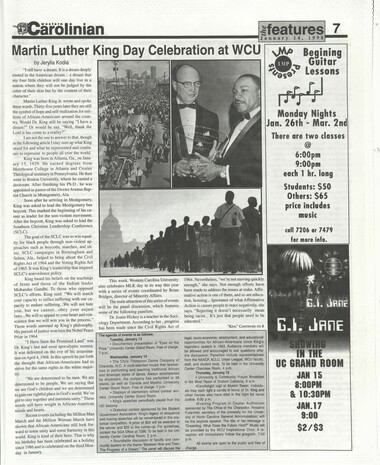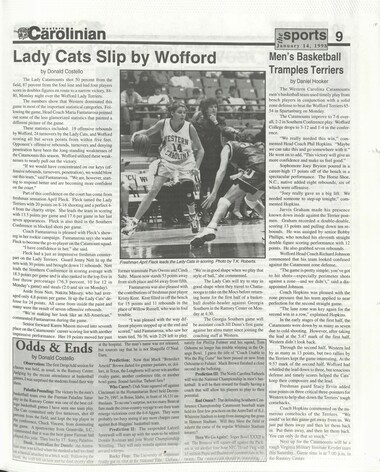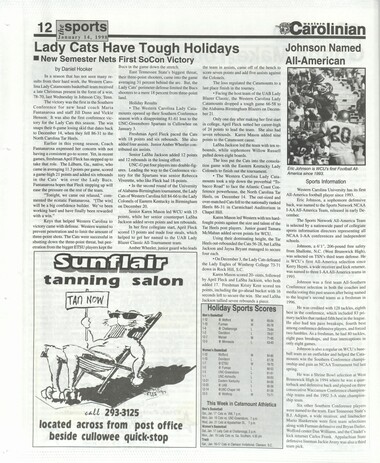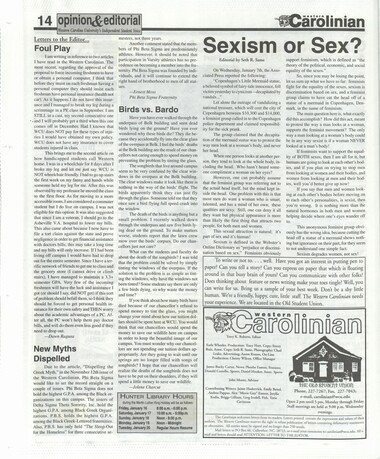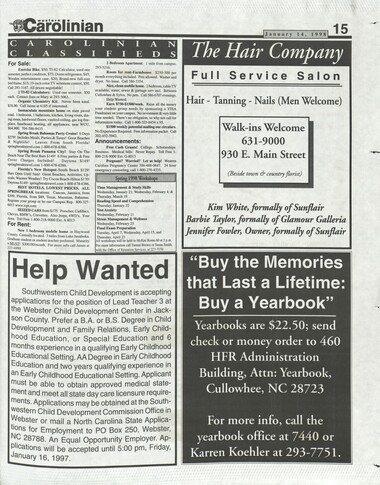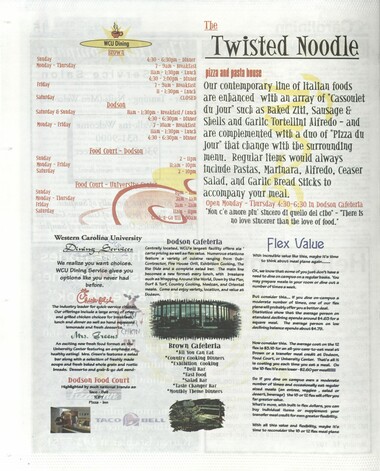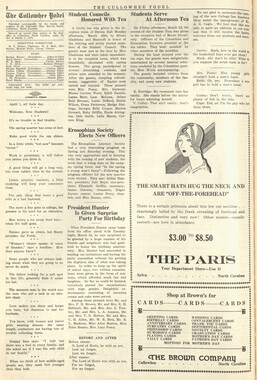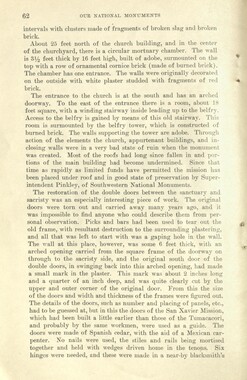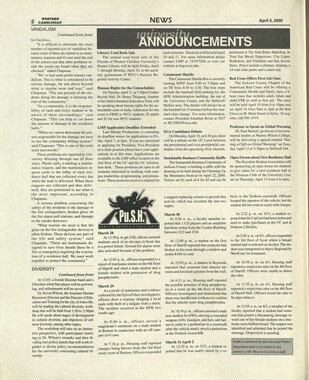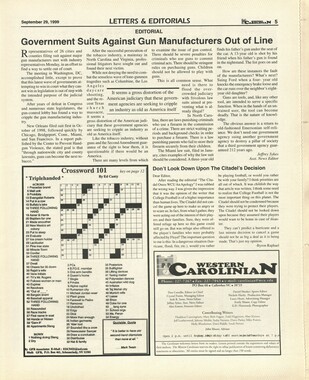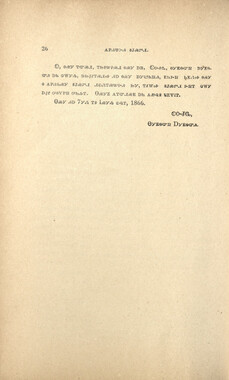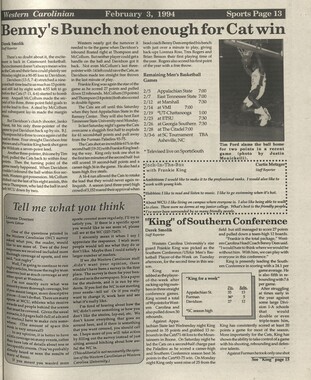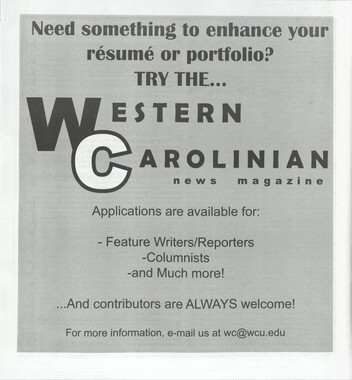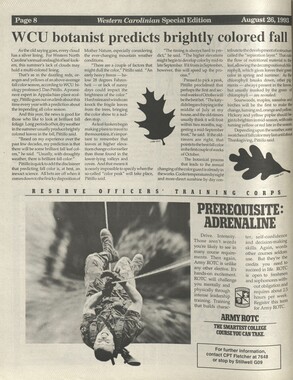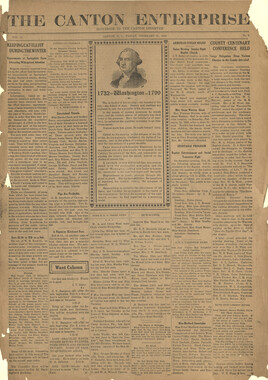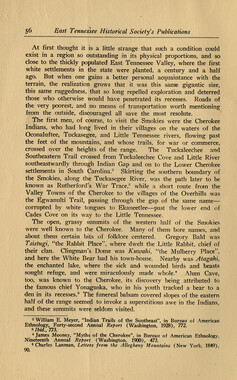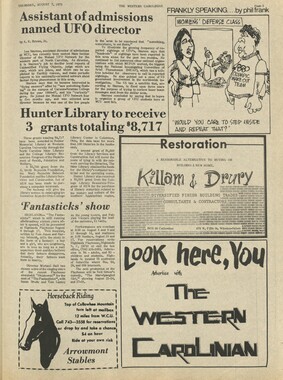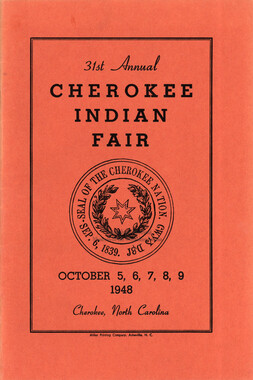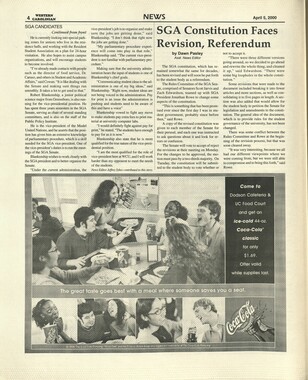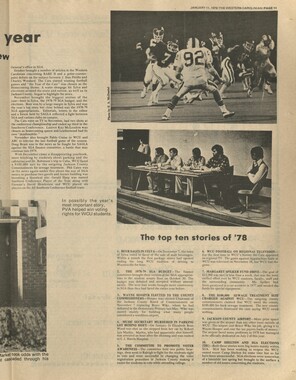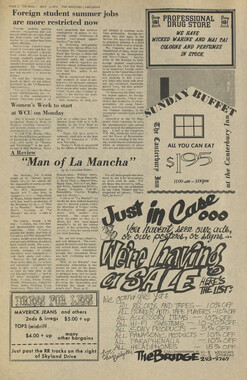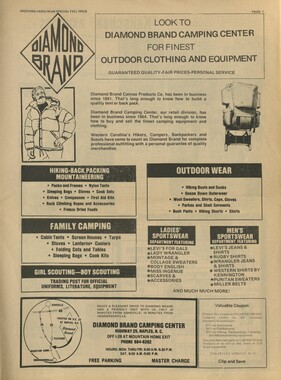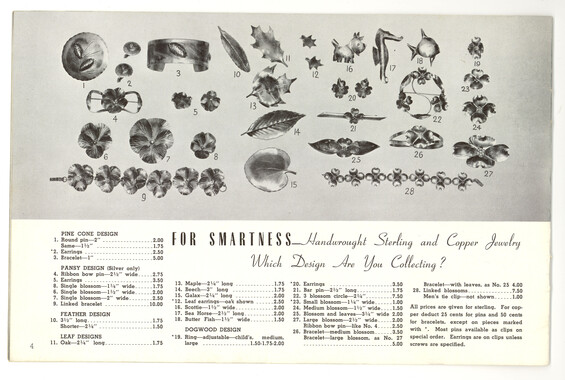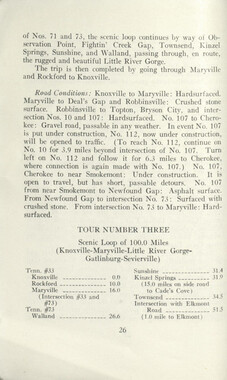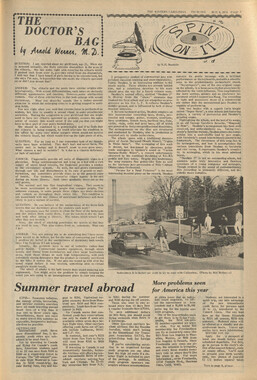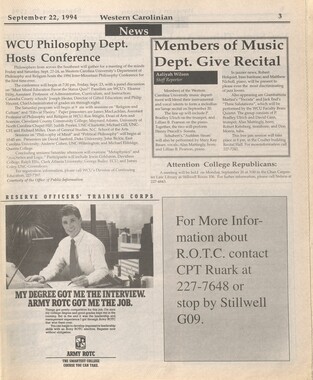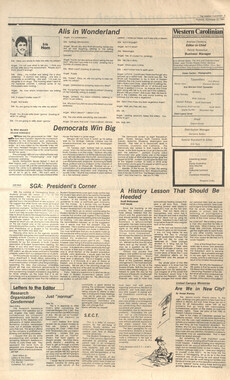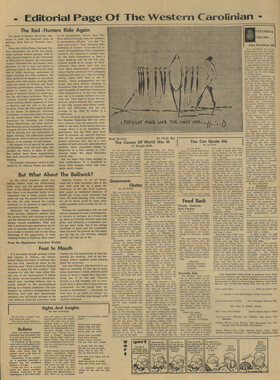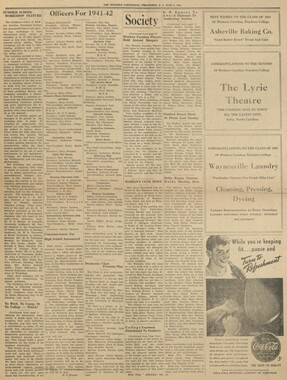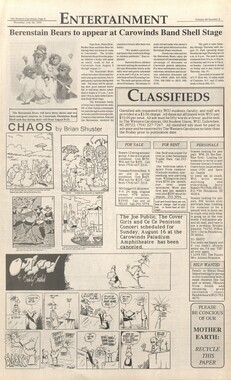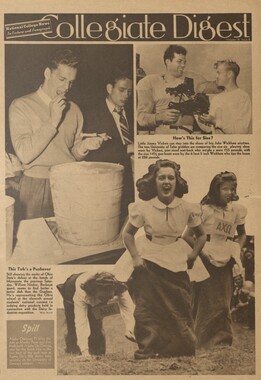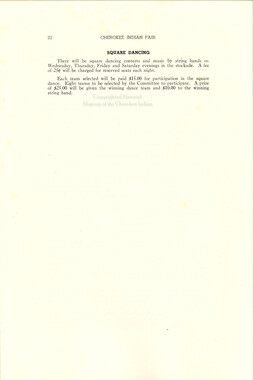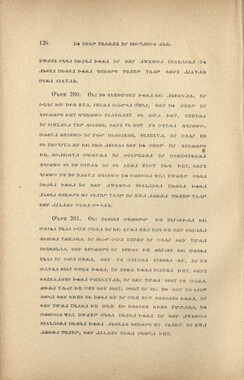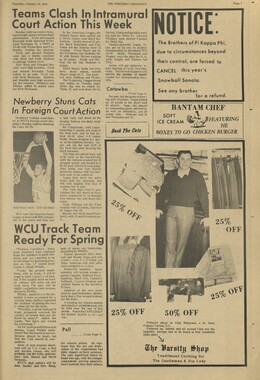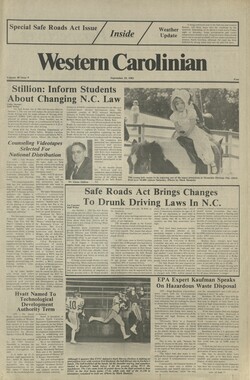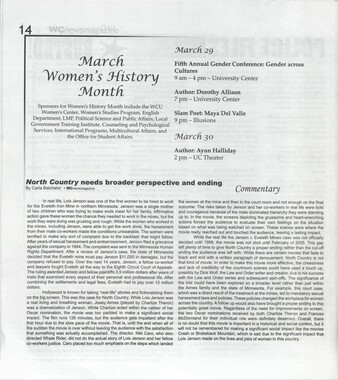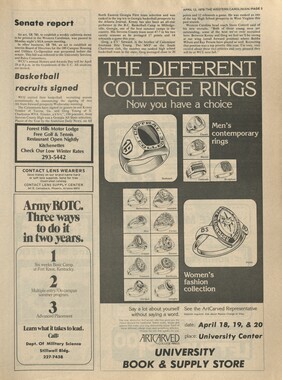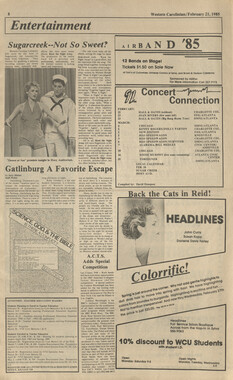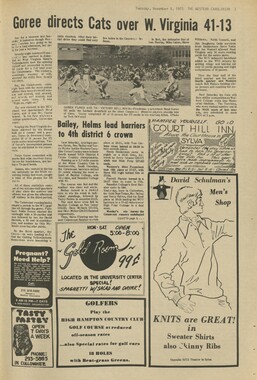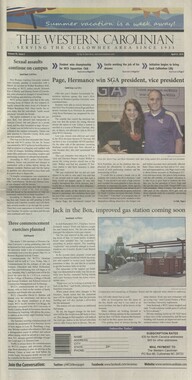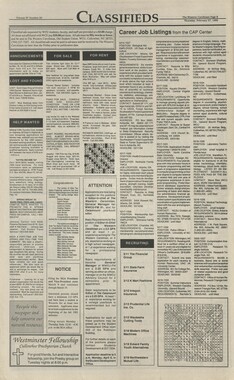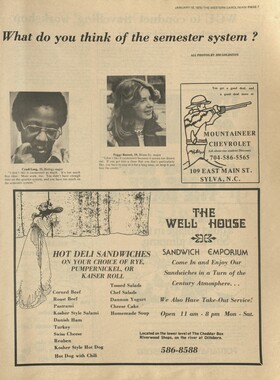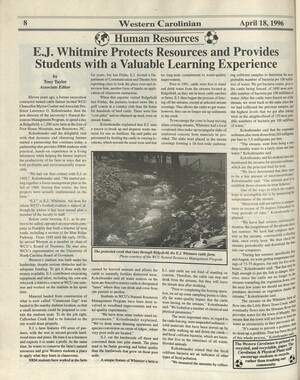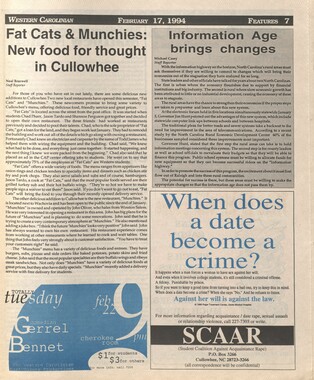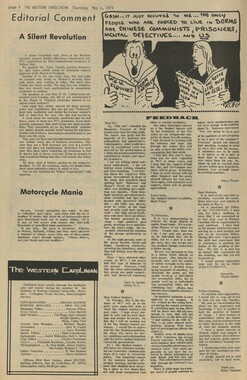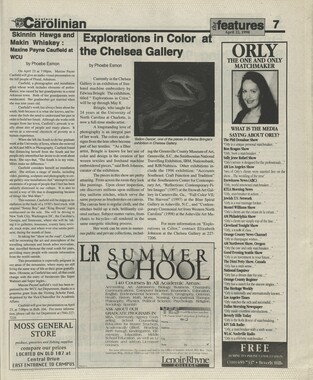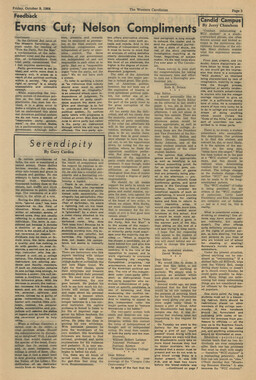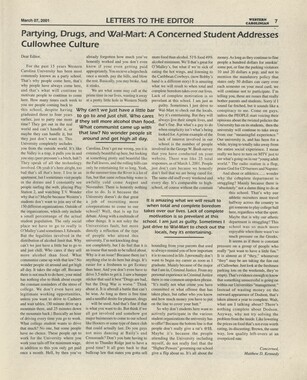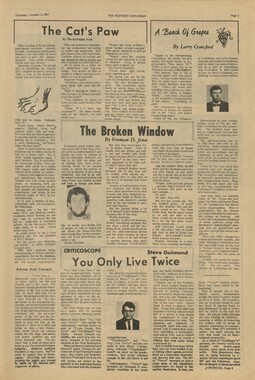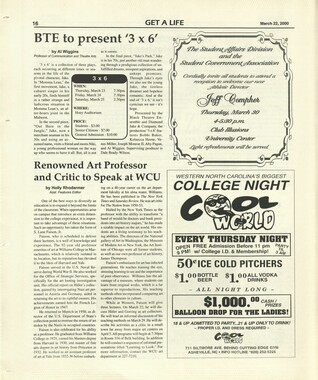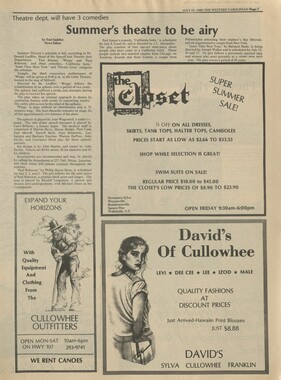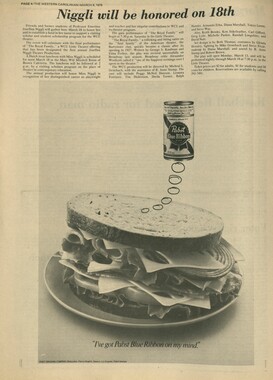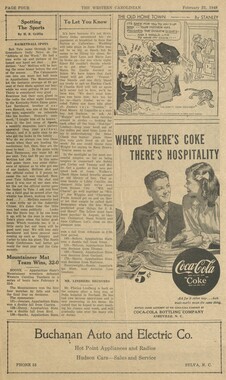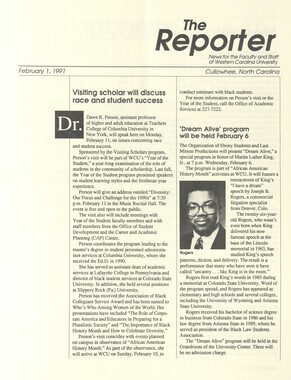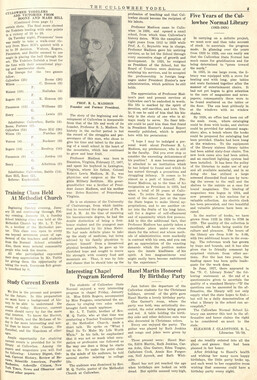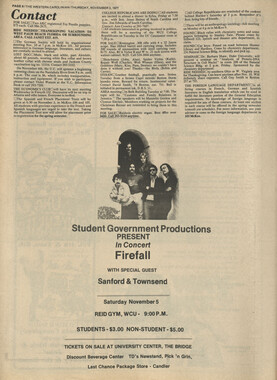Western Carolina University (20)
View all
- Canton Champion Fibre Company (2308)
- Cherokee Traditions (291)
- Civil War in Southern Appalachia (165)
- Craft Revival (1942)
- Great Smoky Mountains - A Park for America (2946)
- Highlights from Western Carolina University (430)
- Horace Kephart (941)
- Journeys Through Jackson (159)
- LGBTQIA+ Archive of Jackson County (85)
- Oral Histories of Western North Carolina (314)
- Picturing Appalachia (6873)
- Stories of Mountain Folk (413)
- Travel Western North Carolina (160)
- Western Carolina University Fine Art Museum Vitreograph Collection (129)
- Western Carolina University Herbarium (92)
- Western Carolina University: Making Memories (738)
- Western Carolina University Publications (2491)
- Western Carolina University Restricted Electronic Theses and Dissertations (146)
- Western North Carolina Regional Maps (71)
- World War II in Southern Appalachia (131)
University of North Carolina Asheville (6)
View all
- Allanstand Cottage Industries (62)
- Appalachian National Park Association (53)
- Bennett, Kelly, 1890-1974 (1463)
- Berry, Walter (76)
- Brasstown Carvers (40)
- Carver, George Washington, 1864?-1943 (26)
- Cathey, Joseph, 1803-1874 (1)
- Champion Fibre Company (233)
- Champion Paper and Fibre Company (297)
- Cherokee Indian Fair Association (16)
- Cherokee Language Program (22)
- Crowe, Amanda (40)
- Edmonston, Thomas Benton, 1842-1907 (7)
- Ensley, A. L. (Abraham Lincoln), 1865-1948 (275)
- Fromer, Irving Rhodes, 1913-1994 (70)
- George Butz (BFS 1907) (46)
- Goodrich, Frances Louisa (120)
- Grant, George Alexander, 1891-1964 (96)
- Heard, Marian Gladys (60)
- Kephart, Calvin, 1883-1969 (15)
- Kephart, Horace, 1862-1931 (313)
- Kephart, Laura, 1862-1954 (39)
- Laney, Gideon Thomas, 1889-1976 (439)
- Masa, George, 1881-1933 (61)
- McElhinney, William Julian, 1896-1953 (44)
- Niggli, Josephina, 1910-1983 (10)
- North Carolina Park Commission (105)
- Osborne, Kezia Stradley (9)
- Owens, Samuel Robert, 1918-1995 (11)
- Penland Weavers and Potters (36)
- Roberts, Vivienne (15)
- Roth, Albert, 1890-1974 (142)
- Schenck, Carl Alwin, 1868-1955 (1)
- Sherrill's Photography Studio (2565)
- Southern Highland Handicraft Guild (127)
- Southern Highlanders, Inc. (71)
- Stalcup, Jesse Bryson (46)
- Stearns, I. K. (213)
- Thompson, James Edward, 1880-1976 (226)
- United States. Indian Arts and Crafts Board (130)
- USFS (683)
- Vance, Zebulon Baird, 1830-1894 (1)
- Weaver, Zebulon, 1872-1948 (58)
- Western Carolina College (230)
- Western Carolina Teachers College (282)
- Western Carolina University (2008)
- Western Carolina University. Mountain Heritage Center (18)
- Whitman, Walt, 1819-1892 (10)
- Wilburn, Hiram Coleman, 1880-1967 (73)
- Williams, Isadora (3)
- Cain, Doreyl Ammons (0)
- Crittenden, Lorraine (0)
- Rhodes, Judy (0)
- Smith, Edward Clark (0)
- Appalachian Region, Southern (2569)
- Asheville (N.C.) (1923)
- Avery County (N.C.) (26)
- Blount County (Tenn.) (195)
- Buncombe County (N.C.) (1672)
- Cherokee County (N.C.) (283)
- Clay County (N.C.) (555)
- Graham County (N.C.) (236)
- Great Smoky Mountains National Park (N.C. and Tenn.) (519)
- Haywood County (N.C.) (3569)
- Henderson County (N.C.) (70)
- Jackson County (N.C.) (4912)
- Knox County (Tenn.) (35)
- Knoxville (Tenn.) (13)
- Lake Santeetlah (N.C.) (10)
- Macon County (N.C.) (420)
- Madison County (N.C.) (215)
- McDowell County (N.C.) (39)
- Mitchell County (N.C.) (132)
- Polk County (N.C.) (35)
- Qualla Boundary (982)
- Rutherford County (N.C.) (76)
- Swain County (N.C.) (2182)
- Transylvania County (N.C.) (270)
- Watauga County (N.C.) (12)
- Waynesville (N.C.) (86)
- Yancey County (N.C.) (72)
- Aerial Photographs (3)
- Aerial Views (60)
- Albums (books) (4)
- Articles (1)
- Artifacts (object Genre) (228)
- Bibliographies (1)
- Biography (general Genre) (2)
- Cards (information Artifacts) (38)
- Clippings (information Artifacts) (191)
- Copybooks (instructional Materials) (3)
- Crafts (art Genres) (622)
- Depictions (visual Works) (21)
- Design Drawings (1)
- Drawings (visual Works) (185)
- Envelopes (73)
- Exhibitions (events) (1)
- Facsimiles (reproductions) (1)
- Fiction (general Genre) (4)
- Financial Records (12)
- Fliers (printed Matter) (67)
- Glass Plate Negatives (381)
- Guidebooks (2)
- Internegatives (10)
- Interviews (815)
- Land Surveys (102)
- Letters (correspondence) (1013)
- Manuscripts (documents) (618)
- Maps (documents) (177)
- Memorandums (25)
- Minutes (administrative Records) (59)
- Negatives (photographs) (6090)
- Newsletters (1290)
- Newspapers (2)
- Notebooks (8)
- Occupation Currency (1)
- Paintings (visual Works) (1)
- Pen And Ink Drawings (1)
- Periodicals (193)
- Personal Narratives (10)
- Photographs (12976)
- Plans (maps) (1)
- Poetry (5)
- Portraits (4568)
- Postcards (329)
- Programs (documents) (181)
- Publications (documents) (2443)
- Questionnaires (65)
- Relief Prints (26)
- Sayings (literary Genre) (1)
- Scrapbooks (282)
- Sheet Music (2)
- Slides (photographs) (402)
- Songs (musical Compositions) (2)
- Sound Recordings (796)
- Specimens (92)
- Speeches (documents) (18)
- Tintypes (photographs) (8)
- Transcripts (322)
- Video Recordings (physical Artifacts) (23)
- Text Messages (0)
- A.L. Ensley Collection (275)
- Appalachian Industrial School Records (7)
- Appalachian National Park Association Records (336)
- Axley-Meroney Collection (2)
- Bayard Wootten Photograph Collection (20)
- Bethel Rural Community Organization Collection (7)
- Blumer Collection (5)
- C.W. Slagle Collection (20)
- Canton Area Historical Museum (2110)
- Carlos C. Campbell Collection (462)
- Cataloochee History Project (64)
- Cherokee Studies Collection (4)
- Daisy Dame Photograph Album (5)
- Daniel Boone VI Collection (1)
- Doris Ulmann Photograph Collection (112)
- Elizabeth H. Lasley Collection (1)
- Elizabeth Woolworth Szold Fleharty Collection (4)
- Frank Fry Collection (95)
- George Masa Collection (173)
- Gideon Laney Collection (452)
- Hazel Scarborough Collection (2)
- Hiram C. Wilburn Papers (28)
- Historic Photographs Collection (236)
- Horace Kephart Collection (861)
- Humbard Collection (33)
- Hunter and Weaver Families Collection (1)
- I. D. Blumenthal Collection (4)
- Isadora Williams Collection (4)
- Jesse Bryson Stalcup Collection (47)
- Jim Thompson Collection (224)
- John B. Battle Collection (7)
- John C. Campbell Folk School Records (80)
- John Parris Collection (6)
- Judaculla Rock project (2)
- Kelly Bennett Collection (1482)
- Love Family Papers (11)
- Major Wiley Parris Civil War Letters (3)
- Map Collection (12)
- McFee-Misemer Civil War Letters (34)
- Mountain Heritage Center Collection (4)
- Norburn - Robertson - Thomson Families Collection (44)
- Pauline Hood Collection (7)
- Pre-Guild Collection (2)
- Qualla Arts and Crafts Mutual Collection (12)
- R.A. Romanes Collection (681)
- Rosser H. Taylor Collection (1)
- Samuel Robert Owens Collection (94)
- Sara Madison Collection (144)
- Sherrill Studio Photo Collection (2558)
- Smoky Mountains Hiking Club Collection (616)
- Stories of Mountain Folk - Radio Programs (374)
- The Reporter, Western Carolina University (510)
- Venoy and Elizabeth Reed Collection (16)
- WCU Gender and Sexuality Oral History Project (32)
- WCU Mountain Heritage Center Oral Histories (25)
- WCU Oral History Collection - Mountain People, Mountain Lives (71)
- WCU Students Newspapers Collection (1923)
- Western North Carolina Tomorrow Black Oral History Project (69)
- William Williams Stringfield Collection (2)
- Zebulon Weaver Collection (109)
- African Americans (390)
- Appalachian Trail (35)
- Artisans (521)
- Cherokee art (84)
- Cherokee artists -- North Carolina (10)
- Cherokee language (21)
- Cherokee pottery (101)
- Cherokee women (208)
- Church buildings (189)
- Civilian Conservation Corps (U.S.) (111)
- College student newspapers and periodicals (2012)
- Dams (107)
- Dance (1023)
- Education (222)
- Floods (61)
- Folk music (1015)
- Forced removal, 1813-1903 (2)
- Forest conservation (220)
- Forests and forestry (1184)
- Gender nonconformity (4)
- Great Smoky Mountains National Park (N.C. and Tenn.) (181)
- Hunting (45)
- Landscape photography (25)
- Logging (119)
- Maps (83)
- Mines and mineral resources (8)
- North Carolina -- Maps (18)
- Paper industry (38)
- Postcards (255)
- Pottery (135)
- Railroad trains (72)
- Rural electrification -- North Carolina, Western (3)
- School integration -- Southern States (2)
- Segregation -- North Carolina, Western (5)
- Slavery (5)
- Sports (452)
- Storytelling (243)
- Waterfalls -- Great Smoky Mountains (N.C. and Tenn.) (66)
- Weaving -- Appalachian Region, Southern (280)
- Wood-carving -- Appalachian Region, Southern (328)
- World War, 1939-1945 (173)
Western Carolinian Volume 62 (63) Number 17
Item
Item’s are ‘child’ level descriptions to ‘parent’ objects, (e.g. one page of a whole book).
-
-
8 The Twelve Point System: Friend or Foe? by Phoebe Esmon ^features January 14, 1998 ^Carolinian For those of you that don't already know it, Fall semester '97 marked the inception of WCU's new grading system. The twelve point scale was voted into policy last spring in an effort to make grading more accurate and fair. Western's old grading system (the ten point scale) was fairly straightforward: A = 4.0, B = 3.0, C = 2.0, D = 1.0, and F = 0.0. The new system isn't that simple. According to a memo sent out on January 28,1997, grades now function as follows: A = 4.0, A- = 3.67, B+ = 3.33, B = 3.00, B- = 2.67, C+ = 2.33, C = 2.0, C- = 1.67, D+ = 1.33, D- = .67, and F = .00. Previously earned grades are not affected by the new policy. However, unlike certain curriculum changes, everyone enrolled in classes at WCU, regardless of how long he or she has been attending, falls under the twelve point system. The new policy has not been welcomed with open arms by all quarters. One student, when asked what she thought of the new system, stated, "I take exception to any progam in which a student can make all A's and not get a 4.0. How is that going to look on a transcript? A senior in his/her last semester of college—someone who has carried a 4.0 for the entirety of their college career, suddenly has their GPA shot to Hades by an A minus." Perhaps, some might say, this new system is going to be the great leveller, the thing that separates the men from the boys, the A's from the A-'s. But if a student does A work, whether + or -, don't they deserve credit for what they've done? It has been held forth by some that this new system is just the product of a wishy-washy society, that it is just an excuse for indecisiveness. On the other hand, some students who found themselves teetering on the A/B bor der are very pleased with the new system. Sometimes a student that almost had an A- was given a "leg up," so to speak, by their attendance and class participation grades. Aaron Krauss, a senior in Communications, had just such an experience. "When I got my grades and saw that I had an A-, I was really mad. I was going to contest my grades. Then I thought about it. If I forced them to change my grade, who's to say that they'd give me an A? I could have gotten a B, and my whole GPA would have dropped even more." Thus we can see that this new system has its perks. The thing is that grading is something of a subjective task at best. There is no way for a professor to really know how much someone did or didn't study. It is unrealistic and impractical to think that teachers have the time or energy to sit on their students' shoulders and catalogue just how much time who spends doing what. Unfortunately grades are based on skills demonstrated in a high-pressure environment, often under duress. Would a simple pass/fail grading system make things any better? Not really— that's even more vague than the system we just dropped. So it seems that, for the time being anyway, the twelve point scale is our only option. Thus it is that we must learn to live with the new monster in our midst. If you're having problems with a class, talk to your professor—don't wait for the situation to sort itself out. If you need help studying, utilize the tutoring sessions made available by the university. Go to the Writing Center. For that matter, just go to class! Even without taking notes, you'll learn more in class than you will skipping and trying to play "outguess the teacher." Buckle down and get yourself in gear. This reporter has the distinct impression that the days of the"Easy A" are over. "King" Continued from 7 When asked if Dr. King could have been replaced, she said, "The charisma, intellect and abilities he had could not be replaced. There were so many characteristics in Martin Luther King the person that others could not fill. The fact that he was a Christian helped a lot in the sense that religion is one of the best ways to get across racism. He put forth the means to get to a common well-being." In this she goes along with Dr. Chris Gunn from Counseling and Psychological Services, who thinks that religion goes far beyond color lines. The marches , the sit-ins and boycotts helped class-consciousness to appear. "What he fought for was noble and right," said Brian Bridges. "He was the catalyst for the civil rights movement. Changes were about to come out, he just sped things up," said Bridges. All African Americans realized that they were not being dealt with fairly. Martin Luther King helped the black community to empower itself. There are no challenges as comparable as the ones he faced in his time. * "You are only as strong as the challenges you face," Hickey said. Hickey also thinks that everyone should take any opportunity to educate each other. African-Americans are "a force to be reckoned with. Things like panel discussions help sensitize people. They engage people into healthy dialogue. As individuals, we can make a difference. Many believe that everything is okay. They don't realize that they share the fate of any racial group, and that if something doesn't go right in one group it will affect the other. We can change things. Why would you try if you did not think there could be a change?" Separate drinking fountains for whites and blacks. "Colored balconies" in movie theaters. Seats in the back of the bus. Could you imagine yourself living in those times? Can you figure out what people had to cope with? Well, believe me, I don't want to go back there, so please make a step forward today. Attend at least one of those events and be part of the movement toward harmony in the United States and among diverse racial groups. New Age, Same Old Problems Commentary by Briggs Gilliam Welcome back folks. Do you feel like I do? The freshness of a new year and the dawning of a new millennium arouse in me both excitement and trepidation. The year 2000 looms gigantic, just up ahead. What events will the new millennium bear witness to? The fate of humanity seems to be a hot topic. Prophecies of an impending Armageddon abound. One can certainly see some feasibility in these predictions of inevitable doom. Our world is still a very volatile and violent place in which to live. The breakneck pace of technology and so called "progress" race along unimpeded, leaving us breathless, confused and even a little frightened. Capitalistic greed and the abuse of political power continue to exploit and dominate the masses. The gap between rich and poor is ever widening. Evil is alive and well as witnessed every night on the evening news. Indeed, oftentimes life appears just as Thomas Hobbes described it: "nasty, brutish and short." But wait. That'll be enough cynicism for this article. There's another, more constructive way to anticipate the burgeoning new millennium: with faith in humanity's ability to find and tap into its collective spirit, right itself, and then begin solving the many problems we have created for ourselves. The most urgent problem we face collectively lies in saving the natural environment upon which our individual physical, psychological, and spiritual well-being depend—an action directly connected to the eventual fate of humanity. Of course we wouldn't be here at all without the necessary physical sustenance provided by nature, such as air, food and water. On another level, however, nature and her wild places are capable of exerting a much more profound influence upon us as human beings. Ralph Waldo Emerson once wrote that "In the woods we return to reason and faith." By this he meant that as long as there is wil derness there will always be for our edification a pure example of sanity and common sense, as well as a temple of worship in which all men and women may enter and gain a deeper sense of their spiritual kinship with the rest of creation. Emerson also meant that within the pureness of nature there exists a sanctuary from the conventions of society. Nature is real. Truth can be found there. There are no lies, only freedom and deliberate action. Society is artificial; an invention designed by people to make the rest of us behave in a prescribed manner. Throughout our lives we experience much conflict and un- happiness as a result of trying to satisfy the whims of society. We are conditioned to feel guilty, inadequate, and sometimes even crazy when we don't "fit in." It is only by comparing the two that we discover the shallowness of society and the transience of its demands. We see that society attempts to alienate us from nature and our natural, authentic selves, pulling us its way when we really want to go another. Without the natural world, the illusions of society would become hopelessly real and binding for all of us. Without nature and her wild places there would be no refuge for the real. Freedom and authenticity would be lost, and living would lose its appeal. As Chnsto- pher Camuto cautions in his book Another Country: Journeying Toward the Cherokee Mountains, "A world uninteresting to wolves will one day be uninteresting to human beings." Hopefully, many of you will choose to become more environmentally conscious in 1998. Protecting nature starts with awareness and individual acts of environmental.^, such as recycling or commuting close tances on foot or by bike. Setting an example is the best way o motivate others. Start a grassroots campa B or ge[ onal to address local environmental issues involved with established local and regj ^ groups. Just get involved. The fate o manity and the direction of the new rru nium hang in the balance he OLd sR/dEnt unjorf We call it borne... and you can too! Writers Needed! For all sections of the Western Caroling (Features, News, Sports and Ef10"^ Bring a writing sample and *™*^t ideas to the top floor of the OWM^ Union, located across from the' ^ building. Staff meetings are at J: Wednesdays, Call 227-7267, or e-«n carolinian@wcu.edu. Summer School 1998!!! Preliminary course schedules now available at • University Center Information Desk • H.F. Robinson Receptionist Desk • Summer School Office, 440 H.F. Robinson, 227-7397 The information you need now to make your course scheduling PlanS-
Object
Object’s are ‘parent’ level descriptions to ‘children’ items, (e.g. a book with pages).
-
The Western Carolinian is Western Carolina University's student-run newspaper. The paper was published as the Cullowhee Yodel from 1924 to 1931 before changing its name to The Western Carolinian in 1933.
-



